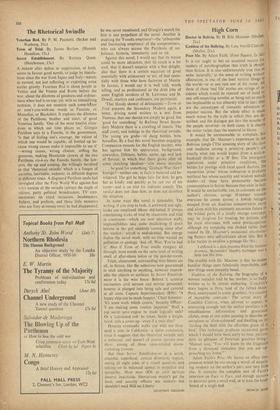The Rhetorical Swindle
A PERIOD after defeat or suppression, or both, seems to favour good novels. to judge by transla- tions since the war from Japan and Italy—novels in earnest, not just reflecting or exploiting some earlier gravity. Venetian Red is about people in Venice and the Veneto and Rome before the war, about the dilemma of goodness and ordinar- iness when bad is on top; yet, with an intensifying restraint, it does not mention such come-hA..her or aren't-you-with-me words as Fascism, or Mussolini, or Blackshirt. It explores the dilemma of the Partibons, brother and sister, of good Venetian family. 'One of the most hateful situa- tions in which our time places us,' Giorgio Partibon says to a Fassola, in the government, 'is that of feeling one's courage, the valour of which one would be capable, all bottled up be- cause wrong causes make it impossible to use it' —wrong causes, wrong climate, stifling the generous, making Hamletish clowns of the two Partibons vis-à-vis the Fassola family, the law- yers, the up and coming, the willingly involved in that 'rhetorical swindle' which is a fungus of societies, inevitable, endemic, in different degrees at different times. A disgraced Partibon uncle had inveighed after the First World War against that era's version of the swindle (always the staple of editors, party political broadcasters, TV com- mentators on royal occasions, headmasters. fathers, and prefects, and those little monsters who are Tory at twenty-two); he had disappeared,
he was never mentioned, and Giorgio's search for him is one propellant of the novel. Another is studying the 'Fassola emptiness'—the 'unbearable and fascinating emptiness' of the compromisers, who can always accuse the Partibons of un- balance, hysteria, immaturity and so on.
Against this novel, I would say that its weave could be more attractive, that its touch is a bit cool, that it doesn't surprise with a fine delight; also that there is a certain equation of good essentially with aristocracy or art, of bad essen- tially with those who have factories at Mestre. In favour, I would say it is well told, worth telling, and as professional as the drab jobs of some English invokers of St. Lawrence and St. Orwell, martyrs and confessors, are provincial.
'That bloody shower of delinquents'—Term of Trial presents the Secondary Modern again, a bitter, driving novel written to a text from Thoreau, that one should not simply be good. but 'good for something.' In Railway Street Secon- dary Modern there is a crawling of insects. The staff crawl, and indulge in the rhetorical swindle. The young are grubs--of dung beetles, bots, horseflies. By a feat this novel becomes engaging. Compassion mounts for the English teacher, who has against him his appearance, background, cowardice, littleness, habits, name, age and lack of flavour; in which blur there glows after all some clutching idealism—'aim above morality . . . be good for something.' Graham Wier (Jew? foreign?—neither one, in fact) is battered and be- wildered. The girl he helps falls for hini; he gets her as kindly and quickly as he can out of his room—and is on trial for indecent assault. The verdict does not clear him, or does not disinfect the situation.
In some ways this novel is detestable. The writing, if you stop to look, is awkward and ugly, tricks are employed (those old-hatted if always entertaining tricks of trial by classroom and trial in courtroom—which are now television stuff), implausibilities take .sorne Swallowing (I don't believe in the girl suddenly -coming clean after the verdict:- which. is melodrania). But energy makes the novel work, with no time wasted on palliation or apology. 'Sod off, Wier. You've had it.' Also if Term of Trial smells vinegary all through, most novels on the same level of writing smell of after-shave lotion or the powder-room.
Trials, classroomS, surrounding wire fences are all, in fiction, like the adhesives now guaranteed to stick anything to anything, however improb- able the objects or surfaces. In Secret Establish- ment it is the wire -fence. Behind it scientist encounters civil servant and service personnel; honesty is plunged into being safe and covered at all costs. Captain Superintendent (RN): 'A happy ship can be made happier.' Chief Scientist: 'It's team work which counts.' Security Officer: 'I am making some routine inquiries.' Shall a top secret aero engine be made logically safe? Or a 'calculated risk' be taken, heads a knight- hood, tails a cover-up--even if a man dies'?
Honesty eventually walks out with ten thou- sand a year in California-- a naïve conclusion,
since it suggests that the rhetorical swindle isn't a universal, and doesn't of course operate over there, among all those open-minded moon- rocketing tycoons.
But then Secret Establishment is a quick, cheerful, superficial, cynical diversion; topical,
seeing all eight sides of a round question, and relying on its balanced appeal to prejudice and sympathy. Most men (RN or civil service) deserve insecticide, libertarians mustn't get the boot, and security officers are stinkers—but shouldn't read Mill on Liberty.
GEOFFREY GRIGSON










































 Previous page
Previous page